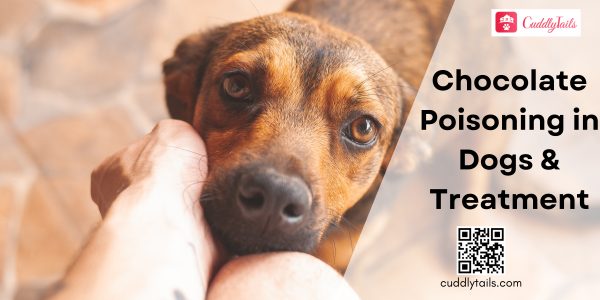Chocolate Poisoning in Dogs and How To Treat It
Dogs have a different metabolism compared to humans, making them more susceptible to the toxic effects of chocolate. Chocolate poisoning in dogs is a serious and potentially life-threatening issue that every pet owner should be aware of and know how to treat it.
Overview of Chocolate Poisoning in Dogs
Chocolate poisoning in dogs occurs when dogs ingest theobromine and caffeine found in chocolate, which are toxic to them. Chocolate affects dogs by causing symptoms like vomiting, diarrhea, increased heart rate, seizures, and even death due to its toxic components.
Milk chocolate and white chocolate, while less toxic, can still cause harm if ingested in large amounts.
Symptoms and Signs of Chocolate Poisoning
Symptoms of chocolate poisoning in dogs can vary depending on factors such as the type of chocolate ingested, the amount consumed, and the size of the dog. Common physical symptoms include vomiting, diarrhea, rapid breathing, and increased heart rate. Behavioral symptoms may include restlessness, agitation, and seizures.
If you have ever wondered why dogs shake, our blog has got you covered.
Advanced symptoms to watch for include muscle tremors, elevated body temperature, rapid breathing, and potentially life-threatening issues like seizures.
Types of Chocolate Toxic to Dogs
Milk Chocolate
Milk chocolate contains lower levels of theobromine compared to dark chocolate but can still be toxic to dogs if ingested in large amounts.
Dark Chocolate
Dark chocolate contains higher amounts of theobromine and can be more dangerous to dogs, leading to severe toxicity even with small quantities.
White Chocolate
White chocolate has the lowest theobromine content among chocolates, making it the least toxic to dogs. However, it can still cause gastrointestinal upset if consumed in excess.
Treatment Options for Chocolate Poisoning
Home Remedies for Chocolate Poisoning
If your dog ingests chocolate, induce vomiting (under professional guidance), offer activated charcoal, and monitor for symptoms. Contact your vet immediately.
Veterinary Care and Treatments
Veterinary care for chocolate poisoning may include IV fluids, medications to control symptoms, and supportive care to help your dog recover safely. Always seek professional help if you suspect chocolate poisoning.
Impact on Different Dog Breeds
Certain dog breeds may be more susceptible to chocolate poisoning due to variations in metabolism and tolerance to theobromine. Small breeds and puppies are particularly vulnerable and may experience more severe symptoms even with small amounts of chocolate.
Long-Term Effects of Chocolate Poisoning
In severe cases, chocolate poisoning can lead to long-term health complications such as heart problems, neurological issues, and organ damage. It’s important to monitor your dog’s health closely after a poisoning incident and seek follow-up care as needed.
Preventing Chocolate Poisoning in Dogs
Safe Storage of Chocolate
Think of chocolate as your secret stash of treats that you don’t want your dog to find. Keep it out of reach and in sealed containers. Get creative with your hiding spots – just make sure they’re dog-proof!
Alternative Dog-Friendly Treats
There are plenty of dog-friendly treats out there that won’t cause harm to your furry friend. Look for treats specifically made for dogs, like peanut butter treats or carrot sticks. Your pup will thank you!
When to Seek Veterinary Care
Guidelines for Seeking Veterinary Help
If your dog gets into the chocolate and you’re feeling more anxious than a squirrel in a dog park, it’s time to call the vet. They’ll give you guidance on what steps to take next based on the amount and type of chocolate ingested.
Emergency Actions to Take
In the meantime, watch your pup closely for any signs of chocolate poisoning like vomiting, diarrhea, restlessness, or a racing heart. And remember, don’t panic – your dog needs you to be cool and calm.
Contacting a vet in real life isn’t possible every time, the reason why we started our 24/7 online telehealth service. Pet parents can now seek health advice about their pups by answering some questions about them. Sweet and simple!
Conclusion
Chocolate and dogs are a combo best left untouched. Keep the chocolate hidden, opt for dog-friendly treats, and know when to seek help. Your pup’s safety is worth it – plus, you don’t want to share your chocolate anyway, right?
In the battle of dog versus chocolate, prevention is your best defense. Stay informed, stay vigilant, and keep the treats puppy-friendly. Your dog will thank you with tail wags and slobbery kisses! Remember, a little awareness and caution can go a long way in keeping our dogs safe from the hazards of chocolate toxicity.
FAQ
Can all types of chocolate be toxic to dogs?
Not all types of chocolate are equally toxic to dogs. Dark chocolate and cocoa powder contain higher levels of theobromine and caffeine, making them more dangerous than milk chocolate.
Can all dogs tolerate small amounts of chocolate?
No, even small amounts of chocolate can be toxic to dogs, regardless of their size or breed.
How much chocolate is considered toxic to dogs?
The toxic dose of chocolate depends on factors such as the type of chocolate, the amount ingested, and the size of the dog. As a general rule, any amount of chocolate should be considered potentially harmful to dogs.
What should I do if my dog eats chocolate?
If your dog ingests chocolate, contact your veterinarian or a pet poison helpline immediately for guidance. Only attempt to treat your dog at home with professional advice.
Are there any safe alternatives to chocolate for dogs?
Yes, there are plenty of safe alternatives to chocolate that you can give to your dog as a treat, such as fruits, vegetables, and homemade dog treats.

